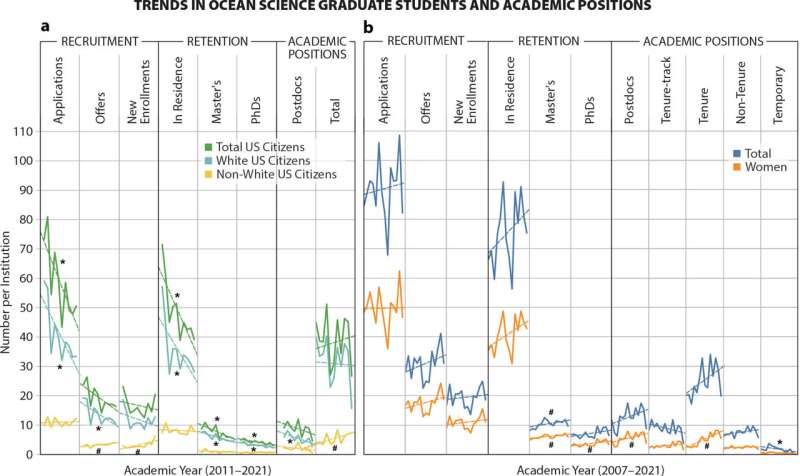This article has been reviewed according to Science X's editorial process and policies. Editors have highlighted the following attributes while ensuring the content's credibility:
fact-checked
peer-reviewed publication
trusted source
proofread
How diverse are US ocean science institutions?

A paper published Dec. 19 in Oceanography examines whether U.S. ocean science institutions are recruiting and retaining the diverse cadre of talent needed to address climate change, food security, sustainable development, and other pressing global challenges.
From 2007 to 2021, the nonprofit Consortium for Ocean Leadership (COL) invited 55 U.S. universities and colleges, including Stanford, to submit graduate student and faculty demographics. On average, 26 institutions reported gender data each year and reported racial data starting in 2011.
"The data are clear: While institutions have increased recruitment of underrepresented U.S. citizens into graduate programs, we need to do a better job of supporting them through graduation," said lead author Staci Lewis, an Early Career Fellow at the Stanford Center for Ocean Solutions and former Senior Policy Manager at COL, which dissolved in 2022. "Science is stronger when it incorporates diverse backgrounds and perspectives. Indeed, it's the only way we'll build the equitable and sustainable ocean and climate solutions we need for the future."
The responding institutions reported academic positions and student recruitment and retention for seven subdisciplines of ocean science: marine policy, marine biology, marine chemistry, marine geology, ocean engineering, physical oceanography, and other ocean sciences like ocean conservation and coastal and estuarine studies. Only ocean engineering has consistently grown in enrollment.
Findings:
- Recruitment of students who identify with underrepresented groups has increased, leading to more diverse cohorts, but their graduation rate remains the same, highlighting that more efforts are needed to support these students in completing their degrees and advancing into ocean science careers.
- Over the 15-year study period, student recruitment in ocean science graduate programs remained static, and fewer U.S. citizens are receiving ocean science graduate degrees. This trend suggests that interest in the field has plateaued despite pressing global need for a healthy ocean to mitigate climate change and provide food security and livelihoods.
- Overall representation of racially underrepresented groups in ocean sciences remains low compared to the U.S. population, particularly among groups that identify as Black or Latino.
- Women represent over half of the student applicants but only 19.8% of tenure-track positions. However, the number of women receiving PhDs, in postdoctoral positions and in tenure positions have increased significantly from 2007 to 2021, a promising trend for their participation at senior academic career levels.
- Data collection ended with the dissolution of the Consortium for Ocean Leadership in 2022. Moving forward, the co-authors recommend that the ocean science community appoint a leader to collect demographic data from institutions in order to assess trends and meaningfully inform efforts for increasing parity in ocean science.
More information: Staci Lewis et al, Assessing Diversity in US Ocean Science Institutions: Insights from Fifteen Years (2007–2021) of OSER Data, Oceanography (2023). DOI: 10.5670/oceanog.2024.134
Journal information: Oceanography
Provided by Stanford University




















